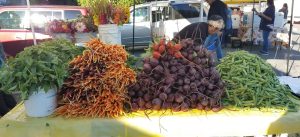As a daughter of immigrant parents who worked as farm hands and are now their own farmers, I have experienced issues of food scarcity and poverty. Looking back, I acknowledge how privileged I am to be where I am today. I am proud of where I came from and how I was brought up. Knowing that my parents overcame obstacles to put me and my siblings in a better place encourages me to help other families who are also struggling from hunger and food scarcity. My parents emigrated from Laos and only knew how to farm as they had no formal education. They provided for their seven kids by becoming berry pickers for large scale berry farms. My parents are still farmers and the amount of work put in does not reflect the amount of money we make. Money is still tight. However, knowing that I am in a position to help those that are facing hunger, I always make it a point to donate my family’s surplus vegetables to local food banks and to appreciate where my food has come from. Being a farmer and participating in contemplative practices during lecture have encouraged me to think critically about where my food has come from, how it was processed and appreciate all the work that was put into the creation of the food. The raisin and raw cacao contemplative practice have reinforced these ideas and pushed the notion that as a society, we must “advocate for the dignity of and respect for the workers who help to produce, process, distribute and serve us our food (Liu, 20).” To achieve justice for this marginalized population, we must empower them. I am a firm believer in using ones privilege to create space and opportunities for those in need and who are less fortunate. Therefore, for countries in power, like the U.S., we need to focus on less exploitative practices that are harmful to not only our local communities, but also towards other developing countries and instead use our bountiful resources to deal with issues such as world hunger.
The image below is of my family’s vegetable booth at the Edmond’s Farmers Market. All of the vegetables (basil, rainbow carrots, red and golden beets and sugar snap peas) are grown organically and are cleaned before being sold.

